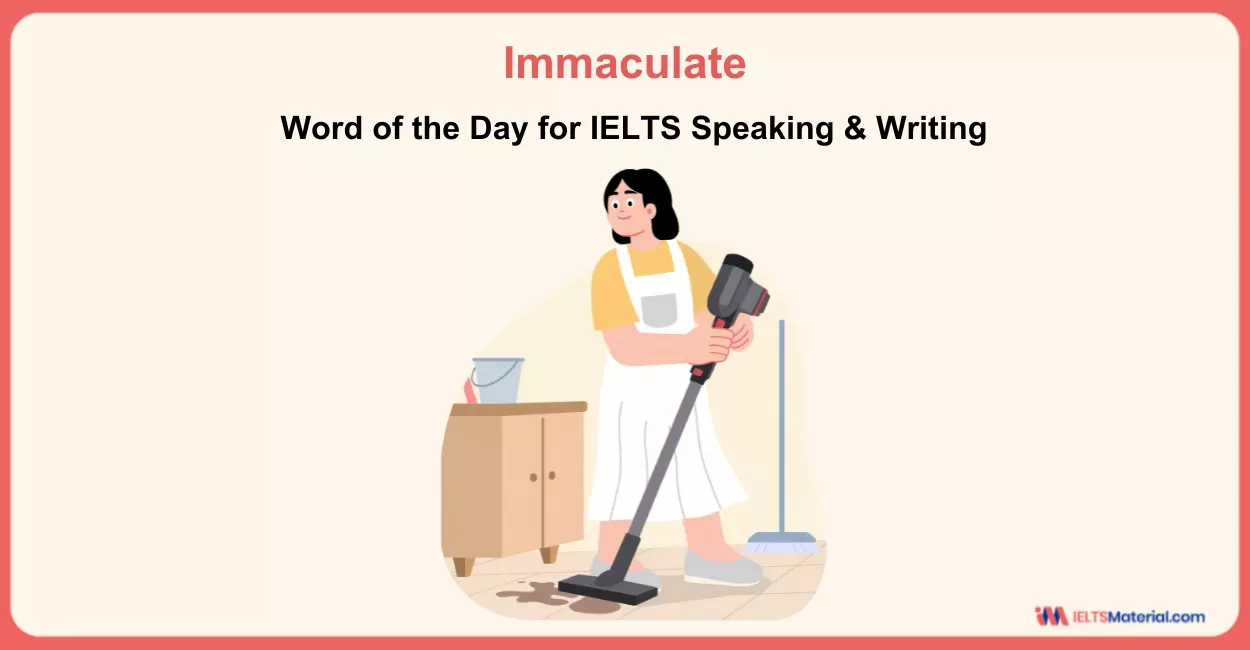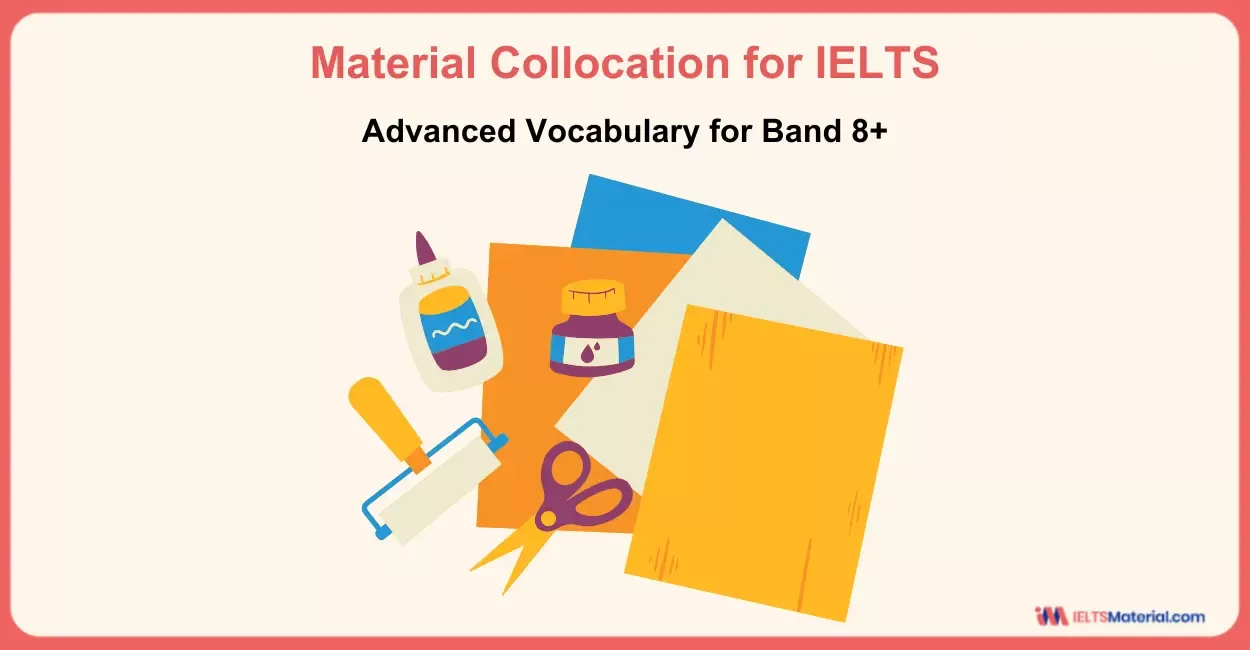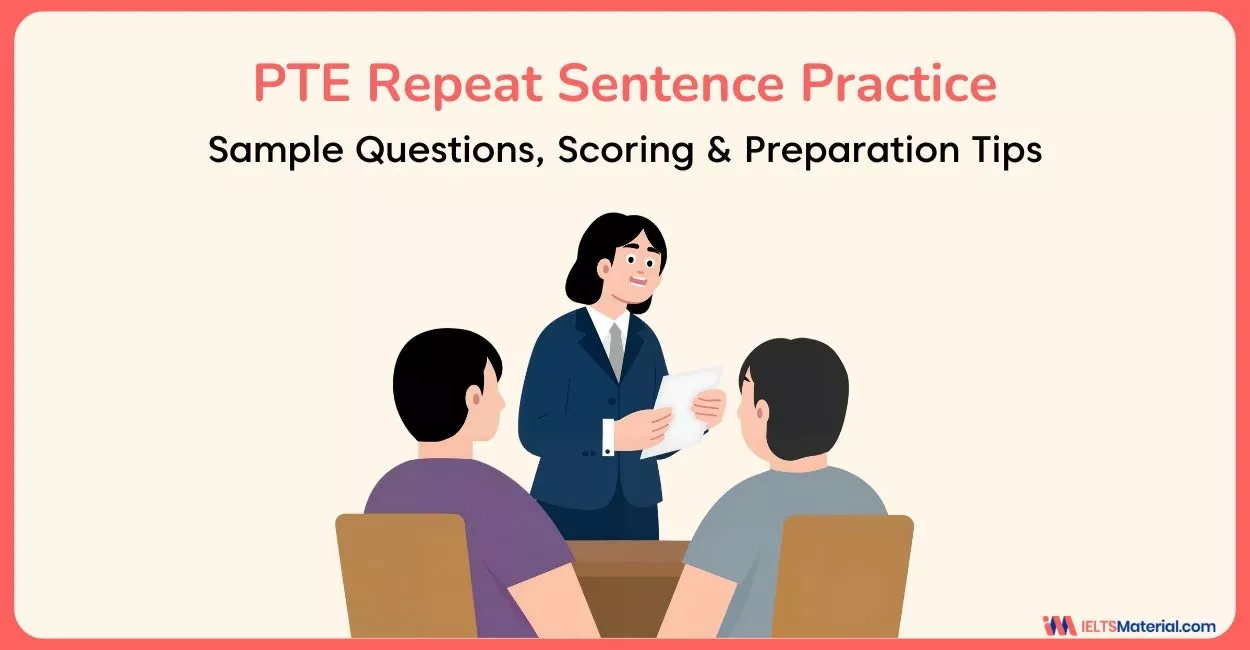Material Collocation for IELTS - Advanced Vocabulary for Band 8+
6 min read
Updated On
-
Copy link
Ready to level up your IELTS vocabulary? Enhance your lexical range and accuracy by diving into Material Collocation for IELTS. Check the different types, exercise, and more to use these advanced vocabulary for achieving a band 8+.
Table of Contents

Limited-Time Offer : Access a FREE 10-Day IELTS Study Plan!
As you learn advanced vocabulary such as Material Collocation for IELTS, you will be able to formulate ideas with more precision and higher academic standards. With such word pairings, you can explore topics on building materials, study materials, or raw materials. Such combinations would showcase your good command of vocabulary and depth of knowledge. In order to get a band score of 8+ in the IELTS Exam, you need to first understand how to use these collocations correctly, along with practical examples and tips to sound more natural and fluent.
Connect with our IELTS Trainers to crack your IELTS exam in no time! FREE Demo.
What are the Different Types of Material Collocation for IELTS?
Using appropriate collocations related to the environment, architecture, clothing, and manufacturing is a must to enhance your IELTS Vocabulary. This would be helpful to refer to the type of matter used where using another word paired with the term can change the meaning altogether. Mastering such phrases makes you more accurate and raises your lexical resource score. Below are some of the different types of Material Collocation for IELTS.
|
Collocation |
Meaning |
Example |
|
Raw material |
The primary matter from which products are made |
A number of developing nations trade in raw materials. |
|
Durable material |
Very strong and long-lasting substance |
The furniture was made of durable materials to resist the harsh climate. |
|
Use material |
To create something with a certain kind of physical substance |
For the new clothing line, the designer used a material that is friendly to the environment. |
|
Handle material |
To move or touch material while using it in the process of working |
Handling of radioactive material is restricted to trained personnel only. |
|
Lightweight material |
Material that has little weight |
For producing electric vehicles, manufacturers prefer lightweight materials. |
|
Source material |
To find or get a specific type of material |
The builder sourced high-quality material from local suppliers. |
|
Eco-friendly material |
Material that does not harm the environment and is not polluting |
To cut down carbon footprint, architects of modern times use eco-friendly materials. |
|
Transparent material |
Material that can be seen through |
In order to provide natural lighting, the roof is made of transparent material. |
|
Insulating material |
Material that does not allow the transmission of heat or electricity |
Insulating materials play a great role in reducing the energy consumption of houses. |
|
Gather material |
To collect data or information for the purposes of a project or report |
The student gathered research material for her dissertation. |
|
Review material |
To look through content again for understanding |
You should review all the course material before the exam. |
|
Organize material |
To arrange content logically and effectively |
The speaker organized her material before giving the talk. |
|
Develop material |
To create educational or informative content |
The company develops training material for new employees. |
|
Publish material |
To make written or visual content available to the public |
The journalist published sensitive material about the case. |
Check out the video below to learn 9 Vocabulary Tips to IMPROVE Your Score for the IELTS Writing Task 2!
Exercise on Material Collocation for IELTS
Once you have succeeded in mastering the Material Collocation for IELTS, the next thing is regular practice. Targeted exercises will help you in remembering and using these expressions effortlessly. In the long run, you will build the linguistic skills and precision that are required for leveling up your preparation.
EXERCISE 1. Use the correct form of these verbs and follow the collocation ‘Verb + Material’ to fill in the blanks:
|
contain |
modify |
treat |
|
made from |
recycle |
use |
1 Not many people realise that the Romans were the first to __________ concrete as a building material.
2 We can assure our customers that all our products are __________ natural materials.
3 I think it would be wrong to allow scientists to __________ human genetic material in order to produce the ‘perfect’ human being.
4 The outer material of the garment has been __________ with wax to make it waterproof.
5 One aim of the Green movement is to encourage people to __________ more of their waste materials.
6 A lot of older buildings __________ harmful materials such as asbestos.
EXERCISE 2. Complete the sentences with these adjectives:
|
hardest |
waste |
inflammable |
radioactive |
|
raw |
synthetic |
recyclable |
hard-wearing |
1 My country has few natural resources and has to import most of its_________ materials.
2 Highly__________ materials like petrol have to be handled with great care.
3 Seat covers on trains and buses take a lot of wear and tear so they need to be made from strong, __________ materials.
4 Our products are environmentally-friendly. We package all of them in __________ materials.
5 Most __________ materials can be put in a washing machine. Unlike many natural fabrics they don’t shrink when washed.
6 Diamonds are one of the__________ materials known to man.
7 The transport of__________ materials is still one of the biggest problems for the power industry.
8 __________ materials should be recycled whenever possible.
EXERCISE 3. Complete the sentences below with these words:
|
reading |
valuable |
copyright |
publicity |
|
indecent |
relevant |
fresh |
classified |
1 All sorts of__________ materials are being used to promote the latest video -TV ads, videos, posters and leaflets.
2 These documents relating to the last war won’t be available to the public for 50 years as they contain __________ material.
3 I’ve listed some useful__________ material at the end of the handout.
4 Employees caught downloading __________ material from the internet will be sacked immediately.
5 I’m afraid this is__________ material. You’re not allowed to copy more than 10% of it and only for private use.
6 The band can’t go on playing the same old songs year after year. It’s time they produced some __________ new material.
7 Professor Smith travelled the world gathering __________ material for his book.
8 When I was researching my family tree, I found a lot of __________ material in the public library.
Notes1. In 3-4‘obscene’ is also possible. 2. Note the following:
3. We talk about building, reading, teaching and writing materials:
4. Notice this expression using noun + of + material:
5. Remember that ‘material’ can be used as a general term to mean ‘things’. It also has a specific meaning when it means ‘cloth’:
|
Answers for the Exercise on Material Collocation for IELTS
Well done! Did you get the answers? Let’s check the correct answers and pay attention to the way collocations are formed and used in context. This analysis will not only help you in spotting mistakes but also in improving your structure and acquiring better fluency. For deeper learning for getting a higher IELTS Band Score, you can start paraphrasing the sentences. With this, you will learn how placing a collocation in different parts of a sentence transforms the tone and the clarity of your answer.
EXERCISE 1.
| 1. use | 2. made from | 3. modify |
| 4. treated | 5. recycle | 6. contain |
EXERCISE 2.
| 1. raw | 2. inflammable | 3. hard-wearing | 4. recyclable |
| 5. synthetic | 6. hardest | 7. radioactive | 8. Waste |
EXERCISE 3.
| 1. publicity | 2. classified | 3. reading | 4. indecent |
| 5. copyright | 6. fresh | 7. valuable | 8. relevant |
Enroll into our Free IELTS Webinar and learn more about techniques to improve your grammar for IELTS.
Discover how Material Collocation for IELTS is capable of transforming your simple ideas into fluent and natural answers. With the acquired knowledge, you can start by creating sentences with a minimum of five new collocations as you attempt an IELTS mock test. Focus on the way these word pairings influence your clarity and confidence which will help build the accuracy and fluency necessary for a Band 8+ performance.
Also Check:

Start Preparing for IELTS: Get Your 10-Day Study Plan Today!
Explore other IELTS Articles

Kasturika Samanta

Haniya Yashfeen
Recent Articles

Nitika Gupt

Nehasri Ravishenbagam

Nehasri Ravishenbagam







Post your Comments